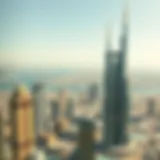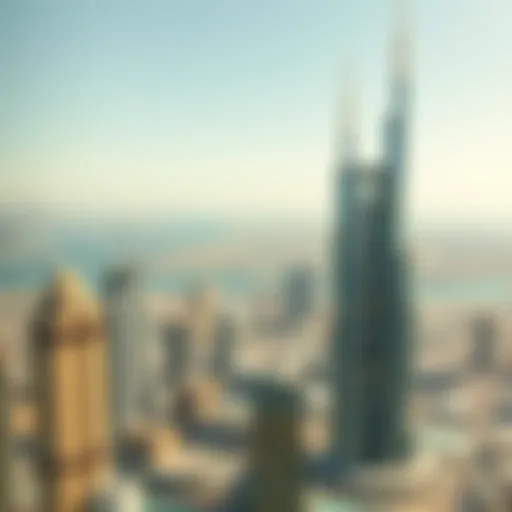Understanding the UAE Ramadan Holiday: Implications and Insights


Intro
Ramadan holds a profound significance in the United Arab Emirates, intertwining cultural values with social customs. Each year, this holy month transforms the UAE’s landscape, not only spiritually but also economically. Whether it’s the way people interact, the rhythm of daily life, or even business operations, Ramadan leaves a notable impact.
This period of fasting is not just about refraining from food and drink; it symbolizes a time for reflection, community bonding, and increased generosity. In the UAE, this translates to unique observance practices that impact every facet of life, including how businesses approach the market. Investors and stakeholders within sectors such as real estate, hospitality, and tourism must navigate through these cultural undercurrents carefully.
Understanding the implications of Ramadan is crucial for anyone involved in these industries. The presence of numerous expatriates mixed with the local population creates a diverse tapestry where differing traditions coexist. This diversity informs the strategies adopted by businesses, which ultimately seek to respect the holiday's sanctity while maximizing opportunities for growth.
During this exploration, we will delve into market trends, the nuances of buying and renting property during Ramadan, and how the observance reshapes consumer behavior. The connection between social practices and market movements is a complex one, revealing much about the broader implications of this significant month in the UAE.
Prelude to Ramadan in the UAE
Ramadan holds a profound significance within the United Arab Emirates, serving as a subtle blend of spirituality and cultural heritage. This sacred month of fasting, reflection, and community feeds seamlessly into the fabric of daily life in the UAE, encapsulating not just the Islamic faith but also the rich traditions of the nation. Understanding how Ramadan operates within this context is more than just recognizing a timeframe; it's about grasping its implications for societal behavior, local customs, and economic activity. As investors, property owners, and businesses consider their roles within this framework, the importance of acknowledging Ramadan's multifaceted aspects cannot be overstated.
Cultural Significance
Culturally, Ramadan is a cornerstone of life in the UAE. During this month, many locals and expatriates alike immerse themselves in the shared traditions that come alive at sunset. If you stroll through neighborhoods, you might notice beautifully adorned lanterns hanging from homes, casting warm glows that symbolize hope and community spirit. Iftar, the meal breaking the fast, brings families and friends together, regardless of their diverse backgrounds, fostering unity in a multicultural society. The essence of giving and sharing shines through, evidenced by the countless community iftars organized by mosques and local charities, where meals are provided for the less fortunate. This period unites people under the banner of kindness, as charity is not merely encouraged but is woven into the very ethos of the season.
Traditions and Practices
Traditions during Ramadan in the UAE are rich and varied. Many families wake up before dawn for Suhoor, the pre-dawn meal, which is not merely a meal but an event, often filled with lively conversation and plans for the day ahead. As the sun dips below the horizon, sounds of the adhan (call to prayer) fill the air, marking the end of the fast. The first bite often consists of dates and water, a practice rooted deeply in tradition.
However, it’s not just food that holds importance; the spiritual aspect cannot be ignored. People often increase their prayers, engage in Quranic readings, and attend special nightly prayers called Taraweeh. Businesses adapt to these traditions too, adjusting their hours to accommodate the changed routines of their clientele, reflecting the rhythm of life in a way that respects both individual needs and societal norms.
In essence, the traditions and practices of Ramadan in the UAE serve as a cultural backdrop, enriching the landscape of the community with shared experiences and values. This month acts as a lens through which the socio-economic dynamics of the country can be observed, influencing everything from consumer habits to communal engagements.
Historical Context of Ramadan Observance
Understanding the historical context of Ramadan observance provides a unique lens through which one can appreciate its significance in the UAE. It’s not just about fasting or refraining from food and drink; it encapsulates centuries of tradition, spirituality, and social dynamics that have evolved considerably over time. The way Ramadan is observed today is influenced by age-old customs, the integration of modernity, and the rich tapestry of cultural influences that characterize the UAE. Highlighting these aspects helps in grasping not only the significance of Ramadan but also its multi-faceted impact on society.
Evolution of Ramadan in the UAE
Ramadan has been a part of Islamic tradition since its inception, but the characterization of how it is observed in the UAE has been shaped by a myriad of factors through the years. Initially, the observance centered primarily around spiritual reflection, prayer, and community gatherings. As the nation embarked on modernization, traditional values intertwined with contemporary practices, forging a unique identity that reflects both religious devotion and cultural pride.
For instance, the advent of technology and mass communication tools has not only modernized the way Ramadan is celebrated, but it has also helped spread awareness about its importance. The cultural mix present in the UAE, due to its diverse expatriate population, has birthed a mosaic of observance styles. Today, you can find Iftar gatherings featuring both traditional Emirati dishes like Al Harees and Luqaimat, alongside global cuisines, which illustrates the inclusivity of the festival.
It's also worth noting that governmental initiatives have celebrated Ramadan through various activities, such as public prayers and community service projects. Such evolutions highlight how Ramadan in the UAE is no longer just a personal journey; it has become a communal experience, enriching both local and expatriate lives.
Legal Framework Around Ramadan
The legal framework surrounding Ramadan observance in the UAE plays a critical role in shaping the experience of the holiday. The laws are informed by Islamic principles and local customs, and they dictate specific regulations that both citizens and residents are expected to follow during the holy month. For instance, the UAE government decrees that businesses, schools, and public institutions adjust their operating hours, allowing for more flexibility for those observing the fast.
More than just regulations, the legal framework also supports the moral and ethical objectives of Ramadan. Public acts of eating, drinking, or smoking during daylight hours are prohibited for both Muslims and non-Muslims, emphasizing respect for the tradition. Violating these rules can attract penalties, reminding everyone of the period’s sanctity.
Furthermore, businesses are encouraged to show sensitivity towards these practices, which reflects a broader cultural expectation where both awareness and respect towards Ramadan are ingrained. Firms often adopt corporate social responsibility initiatives, providing Iftar meals to their employees or actively participating in charitable endeavors. Doing so not only adheres to legal expectations but also fosters teamwork and community cohesion.
"Understanding the historical context of Ramadan helps to appreciate its genuine significance, revealing how age-old traditions blend seamlessly with modern practices."
In summary, the historical context of Ramadan observance sheds light on its evolution and the legal scaffolding that supports it within the UAE. This foundation shapes not only how individuals observe the holy month, but also how the broader community interacts with and honors the essence of Ramadan today. Investors, buyers, agents, and analysts can gain valuable insights into the social and economic implications that arise from these evolving traditions and legal structures, positioning themselves strategically in markets influenced by the holiday.
Economic Impact of Ramadan


The economic impact of Ramadan in the UAE is noteworthy, shaping various sectors and influencing consumer behavior significantly. As a time of spiritual reflection and community engagement, the economic activities also surge, presenting both opportunities and challenges. Having a clear understanding of these dynamics can provide crucial insights for investors, businesses, and analysts looking to tap into the unique market conditions that Ramadan presents.
Consumer Spending Trends
During Ramadan, consumer spending in the UAE traditionally sees a notable spike, particularly in areas like retail and food services. Many families tend to increase their expenditure on food, clothing, and gifts as a part of the holiday customs. It's common to observe bustling marketplaces, especially during Iftar, where families congregate to break their fast. This surge in spending is often driven by promotions and festive sales that lead shoppers to explore various offerings.
- Increased Food Expenditures: Restaurants and grocery stores often document higher sales as households prepare for Iftar and Suhoor meals. Restaurants may roll out special Ramadan menus, enticing diners to indulge in traditional dishes.
- Promotional Campaigns: Retailers frequently initiate marketing campaigns to attract shoppers, presenting discounts that run throughout the fasting month. For example, Carrefour and Lulu Hypermarket may have special promotions on essential food items.
- Gift Giving: The act of giving is especially pronounced, escalating demand for gift items such as sweets and decorative items. People tend to buy more, sometimes in bulk, to share with family and friends.
However, it’s vital to recognize that while spending increases, consumers may also become more selective, preferring quality over quantity in their purchases. Generally, this trend can offer a unique lens through which businesses can refine their strategies to cater to evolving consumer preferences during this period.
Influence on Tourism
Ramadan's influence on tourism in the UAE is multifaceted, impacting travel patterns and the types of experiences sought by visitors. While some might view Ramadan as a quiet time for tourism, it can also present a rich cultural experience for travelers seeking to engage with local traditions.
- Cultural Tourism: Tourists often visit to experience Iftar events, which can include large communal gatherings in public spaces like parks or hotels. These events provide a taste of authentic Emirati hospitality and culinary practices.
- Attractions and Festivals: Several cities, particularly Dubai, host special events and festivals during Ramadan. These can range from cultural exhibitions to markets that showcase local crafts, pulling tourists eager to engage with UAE’s rich cultural tapestry.
- Travel Packages: Travel agencies may offer specific packages that highlight Iftar dinners and excursions focused on Ramadan activities, leading to increased bookings during this month.
"Ramadan offers an incredible opportunity for tourists to witness the hospitality and cultural depth of the UAE, enriching their travel experience significantly."
The convergence of heightened local engagement and targeted tourism strategies not only bolsters economic activity but also fosters an environment where cultural understanding thrives. Addressing these trends allows stakeholders to gauge visitor motivations and adapt services accordingly, keeping in mind that Ramadan is a peak time for some visitors eager to indulge in the UAE’s spirited ambiance.
Ramadan and the Real Estate Sector
The observance of Ramadan holds a unique significance in how certain industries operate, particularly the real estate sector within the UAE. It is not merely a religious period; it also brings a shift in lifestyle, consumer behavior, and market dynamics that can greatly impact property rentals, sales, and investments. Understanding these implications is vital for investors, agents, and analysts alike as they navigate through the changing tides of the real estate landscape during this holy month.
Market Dynamics During Ramadan
During Ramadan, the temperature isn’t just rising due to the sun—so are the market dynamics. As the month progresses, you may notice a notable dip in activity during daylight hours. Traditional working hours are adjusted to accommodate fasting, leading to a shorter workday. This reshuffling can result in changes in buyer engagement and responsiveness.
Additionally, property viewings often see an increase in the evening hours, particularly after Iftar, the meal breaking the fast. This shift means agents should be prepared for a surge in after-hours inquiries. Key performance indicators of the market also tend to reflect a slower pace initially but may surge during the weeks leading up to Eid, when buyers are buoyed by the upcoming celebrations and inclined to finalize deals.
"Ramadan is a time for reflection, but it also provides a unique opportunity for real estate engagement post-fast."
Rental Trends in Ramadan
When it comes to rentals, the landscape during Ramadan undergoes subtle yet significant transformations. Many landlords choose to adjust their rental prices, knowing that the influx of expatriates during the festive month can create a tight housing market. The rental market often sees properties being rented at premium prices—especially for those close to places of worship or community centers that offer Iftar meals.
A few trends observed include:
- High Demand for Flexible Rentals: With many people traveling home or taking time off during Ramadan, rental demand can fluctuate. Short-term rentals, like those on Airbnb, often experience high occupancy rates as people look for flexible housing options.
- Family-Oriented Spaces: Properties that accommodate families and reflect cultural sensitivities, like the availability of communal spaces for families to gather during Iftar, see increased interest.
Purchasing Behavior Alterations
Ramadan alters not only how people live but also how they purchase. This period sees changes in buyers' priorities and motivations.
Some notable shifts include:
- Preference for Larger Spaces: Families tend to prioritize larger homes during this time to host gatherings and celebrations. The desire for communal living increases, pushing buyers to seek spacious properties.
- Emphasis on Amenities: Properties with amenities that enhance the Ramadan experience—like pools for evening relaxation after a long day of fasting or proximity to mosques—gain traction.
- Post-Ramadan Investments: Many buyers delay significant purchases until after Ramadan, planning around Eid festivities. This period is often seen as a prelude to larger investments and buying decisions.
Social Aspects of Ramadan
The social dimensions of Ramadan are profound, offering not just a time for spiritual reflection but also serving as a catalyst for community connections and charitable activities. In the diverse landscape of the UAE, these social rituals strengthen ties among neighbors, families, and strangers alike, enriching the communal fabric of society. As citizens and residents of different backgrounds come together, Ramadan transforms the environment into one of collective goodwill, making it an essential focal point of the holiday.


Community Engagement Activities
During Ramadan, social gatherings become a cultural hallmark. Community engagement is a multifaceted phenomenon where individuals participate actively in various programs designed to foster togetherness. Here are some notable activities:
- Iftar Gatherings: Every evening as the sun sets, the breaking of the fast (Iftar) brings people together. Families invite friends and neighbors, creating a warm atmosphere of sharing.
- Public Iftar Events: Various organizations host large-scale Iftar gatherings in parks and community centers, open to everyone. These events not only provide meals but also encourage mingling among people from different backgrounds.
- Volunteer Initiatives: Many engage in volunteering during Ramadan, distributing food to those in need or preparing meals for large gatherings. This spirit of giving ensures the less fortunate feel included in the Ramadan experience.
- Cultural Festivals: Many Emirates organize cultural exhibitions showcasing Ramadan traditions, crafts, and cuisines, inviting community members to learn and share their heritage.
Such activities do not merely serve to fill bellies; they fill hearts and strengthen community bonds, rendering Ramadan a powerful period of unity and shared experiences.
Charitable Practices and Giving
Ramadan is synonymous with generosity, embodying values of charity and empathy. The month encourages a heightened sense of responsibility towards the less fortunate. Charitable practices during this time take several forms:
- Zakat and Sadaqah: Many Muslims fulfill Zakat (obligatory almsgiving) during Ramadan, ensuring their contributions address the needs of those less fortunate. Sadaqah (voluntary charity) also sees a spike as individuals donate generously to various causes.
- Food Drives: Numerous organizations initiate food drives to gather essential items for those who are struggling. Distribution points are set up across neighborhoods, allowing anyone to contribute.
- Aid Campaigns: Non-profits launch campaigns specifically for Ramadan, focusing on food, medical assistance, and educational support for underserved populations.
- Community Fundraisers: Events to raise funds for local charities become quite common. These gatherings provide a platform for individuals to contribute to significant causes while enjoying fellowship and communal activities.
“During Ramadan, the act of giving is not just a religious duty; it evolves into a shared commitment to uplift and support those around us.”
The outcomes of these charitable practices extend beyond the month itself, fostering a culture of ongoing support that catalyzes persistent efforts towards community aid, thus reflecting the core essence of Ramadan as a season of generosity and humanitarian spirit.
Challenges Faced During Ramadan
Understanding the challenges faced during Ramadan in the UAE is crucial for several reasons. Ramadan is not just a month of fasting; it also poses unique challenges that can affect daily life, work dynamics, and health aspects. Particularly for investors, buyers, agents, designers, and analysts, recognizing these challenges is paramount in navigating how businesses adapt during this holy month, ensuring strategies align with the shifting landscape.
Impact on Work Schedules
During Ramadan, the traditional work schedule often undergoes significant adjustments. Most organizations reduce working hours, typically to six instead of the standard eight, in an effort to accommodate the needs of employees who are fasting.
This change can impact productivity levels, as the collective focus may wane, especially in the early afternoon when hunger pangs might strike. Companies need to ensure that their employees remain engaged and energized, which might involve re-evaluating project timelines and deadlines.
- Flexibility and Adaptation: Organizations often shift meeting times to earlier in the day. This practice can lead to a bottleneck of work being compressed into fewer hours, making time management a crucial skill during this period.
- Communication is Key: Clear communication within teams becomes vital to maintain productivity amid the changes. Employers are encouraged to check in with employees, fostering an atmosphere of understanding and support.
- Cultural Sensitivity Training: For businesses with diverse workforces, cultural sensitivity can ease the transition. Training can help non-Muslims understand their colleagues' experiences, ultimately fostering a better working environment.
In addition to managing time, the mindset of the workforce can significantly influence output. Recognizing the cultural importance of this month, most organizations strive to create a supportive atmosphere that acknowledges the personal sacrifices made by their employees.
Health Considerations
Fasting, while deeply spiritual, also poses health challenges that deserve attention. The change in eating patterns can lead to various health issues, especially if not managed properly.
- Hydration is Crucial: Employees need to stay adequately hydrated during non-fasting hours. Dehydration can lead to fatigue, decreased concentration, and other health concerns. It is vital to encourage practices that prioritize water intake, especially during Suhoor and after iftar.
- Balanced Nutrition: Eating large meals immediately after fasting can cause digestive problems. It’s essential to focus on balanced meals that prevent sudden spikes in blood sugar. Guidance on meal planning can support healthier decisions that sustain energy levels throughout the day.
- Physical Well-being: The lack of food and water during daylight hours can affect physical performance. Mild exercise, like walking or stretching post-iftar, can assist in maintaining physical health without compromising fasting traditions.
Ramadan is indeed a time for spiritual reflection, but it is equally a period where attention should also be given to its challenges. Understanding these nuances is critical for anyone involved in the business sector in the UAE, as they can impact overall efficiency and well-being. Supporting employees through these challenges can foster loyalty and boost morale—a win-win situation for businesses aiming to thrive.
Culinary Celebrations During Ramadan
The culinary practices during Ramadan hold a special place in the hearts and kitchens of the UAE. Each dish prepared for this holy month carries a sense of tradition and a spirit of togetherness. The meals served, particularly Iftar and Suhoor, are more than just food; they symbolize community, gratitude, and the cultural heritage that is deeply woven into the fabric of Emirati life.
Iftar and Suhoor: Meal Customs
Iftar, the meal that breaks the daily fast at sunset, is a time of gathering and celebration. It traditionally starts with the eating of dates and drinking of water, following the practices of the Prophet Muhammad. This initial act of breaking the fast is laden with significance, as it marks the end of the day's spiritual journey through fasting.
During Iftar, families and friends come together around a table laden with a variety of dishes. From aromatic biryani to sweet kunafa, the selection can vary widely, reflecting both local flavors and global influences. Each household may have its signature dish that is prepared with love, aiming to nourish both the body and the spirit.
Suhoor, the pre-dawn meal, is equally important. It ensures that individuals are well-prepared for the day ahead. Many choose to have hearty meals that can sustain them through the long hours of fasting, often incorporating proteins and whole grains. In recent years, health-conscious choices have gained popularity, with some opting for lighter fare like yogurt and fruits.


The significance of these meals extends beyond nourishment. They create bonds among family members and friends, as sharing a meal fosters unity and strengthens relationships. Additionally, communal Iftar events are common, where neighbors gather to share food and goodwill.
“Food is not just a means of survival, but a testament to the love and traditions that bind us.”
Culinary Offerings in the Hospitality Sector
The hospitality sector in the UAE sees a remarkable transformation during Ramadan. Restaurants and hotels design special menus to cater to the unique demands of the season. Establishments strive to create enchanting dining experiences that bring together both locals and expatriates.
Many hotels host elaborate Iftar buffets, which are a feast for the senses. These offerings often include live cooking stations, showcasing chefs preparing traditional dishes like lamb ouzi or seafood platters.
Moreover, culinary workshops and events highlight the importance of Ramadan cuisine. Some establishments even invite renowned chefs from around the globe to create fusion dishes, adding an intriguing twist to traditional favorites. This not only elevates the dining experience but also fosters creativity in culinary practices.
As the season progresses, the emphasis on sustainability and locally sourced ingredients becomes evident. Many restaurants are actively promoting local farms, ensuring that the food served during Ramadan is both fresh and beneficial to the community's economy. By choosing local ingredients, they not only reduce their carbon footprint but also support local farmers and vendors.
The Future of Ramadan in the UAE
As the UAE steps into a new era post-pandemic, the future of Ramadan brings with it a host of implications worthy of consideration. The observance of this holy month affects countless facets of society—from cultural traditions and economic activity to community engagement. Understanding the trajectory of Ramadan in the UAE requires an examination of both its historical significance and how contemporary society is reshaping its observance.
Post-COVID Observances
The aftermath of COVID-19 has transformed how Ramadan is celebrated in the UAE. Once characterized by large gatherings and community feasts, many of the customs have pivoted towards smaller, more intimate settings. The pandemic has drilled home the importance of social distancing, leading families to prioritize their immediate circles rather than large public celebrations. For instance, drive-through iftars have become a new favorite, allowing the essence of togetherness to persist while maintaining safety protocols.
"In a matter of months, the face of Ramadan morphed, emphasizing resilience and adaptability—a trend that's likely to shape future observances."
Additionally, virtual gatherings via platforms like Zoom have surged in popularity, allowing families and friends to connect across distances and share meals digitally. The notion of celebrating together while apart has carved a novel path for Ramadan traditions, ensuring that the spiritual essence remains intact, albeit in a different form. It’s crucial for local businesses and hospitality sectors to heed these changes, as they will need to adapt their offerings to meet the evolving demands of consumers during this significant month.
Evolving Traditions
Traditions surrounding Ramadan are not static; they evolve in response to societal changes and external influences. As the UAE becomes increasingly cosmopolitan, we witness a unique blend of customs from various cultures, enriching the local observance. This fusion presents opportunities for culinary innovations, where traditional Emirati dishes are complemented by flavors from across the world, appealing to the diverse population in the UAE.
Furthermore, religious practices are likely to amalgamate modern technology. From prayer apps that help millions keep track of their schedules, to online charity platforms that facilitate donations, technology will play an integral role in how people engage with their faith.
The importance of sustainability also emerges as a significant theme for the future of Ramadan celebrations. As awareness of environmental issues grows, people may increasingly opt for eco-friendly practices, such as using biodegradable materials for iftar meals and minimizing food waste.
Ultimately, the future of Ramadan in the UAE reflects a dynamic interplay between the old and the new, where tradition meets innovation. Investors and stakeholders must remain vigilant to these shifts, as they not only impact community engagement but also can lead to new business opportunities within the hospitality, real estate, and retail sectors. Growing awareness about the significance of Ramadan will continue to inform practices and strategies across these industries, ensuring they cater effectively to the needs of a changing demographic.
Epilogue
The conclusion serves as the cornerstone of this article, weaving together the diverse threads explored throughout the discussion on Ramadan in the UAE. The holiday, deeply rooted in cultural and social practices, extends beyond mere observance of fasting. It impacts economic landscapes, influences social behaviors, and shapes community identities. Specific elements highlighted in this article—ranging from consumer behaviors, market dynamics, and charitable practices—demonstrate the intricate relationship between tradition and modern life within the UAE.
Summary of Insights
In examining the significance of the Ramadan holiday, several key insights emerge:
- Cultural Significance: Ramadan is not just a month of fasting but a period that fosters community ties and invites compassion. People engage in acts of generosity, reflecting the core values of the Emirati culture.
- Economic Influence: The holiday greatly affects consumer spending, with variations seen in hospitality sectors as restaurants offer special Iftar experiences. This surge translates into increased foot traffic, notably in markets and shopping centers, which often feature promotional events during this time.
- Social Connectivity: Community engagement activities during Ramadan, such as shared meals and charity, play an essential role in strengthening social bonds. The communal nature of Ramadan serves to nurture a sense of belonging among residents.
- Challenges and Adaptations: Despite the joyful observances, challenges like altered work schedules and health considerations necessitate adaptations in daily life. Companies often adjust their operational hours to accommodate fasting employees, highlighting the holiday's broader implications.
Final Thoughts
As we close this examination of Ramadan's multifaceted impact in the UAE, it becomes clear that this month of reflection and community is a powerful force shaping the fabric of society. While it is marked by religious observance, the broader implications for economic and social structures cannot be understated.
The evolution of traditions, especially in the post-COVID era, suggests that the essence of Ramadan will continue to adapt. This adaptability could manifest in evolving customs that remain rooted in tradition while accommodating contemporary lifestyles.
In summary, understanding Ramadan in the UAE offers valuable insights not just for locals, but for investors, buyers, and analysts seeking to navigate the unique social and economic landscapes.
"Ramadan creates a tapestry of connections that weaves together the past and the future, fostering a sense of unity that extends far beyond the breaking of fast."
For further exploration of these themes, resources such as Britannica and Wikipedia can provide additional depth to one’s understanding.













